Daniels College of Business kicks off 2020–21 Voices of Experience speaker series
Weeks away from the upcoming ski season, with COVID-19 cases sharply rising and all eyes on the U.S. election, 132 people logged on to watch Aspen Skiing Company President and CEO Mike Kaplan, Snowsports Industries America (SIA) President Nick Sargent and Protect Our Winters (POW) Executive Director Mario Molina discuss sustainability efforts in the snow sports industry.
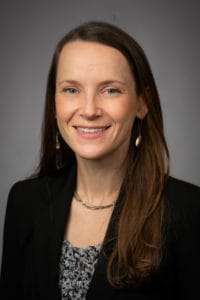
Tricia Olsen
Moderated by Associate Dean for Undergraduate Programs and Associate Professor in Business Ethics and Legal Studies Tricia Olsen, the panel discussed their mutual passion for the snow sports industry and the necessity of environmental advocacy to ensure it continues for generations to come.
COVID-19 Effects on 2020 Ski Seasons
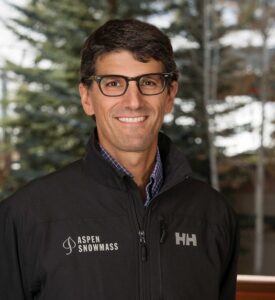
Mike Kaplan
Kaplan (MBA 1993) kicked off the first 2020–21 Voices of Experience speaker series event Oct. 29 by sharing how the COVID-19 pandemic has affected his world. He learned at 6:30 p.m. March 14 that Aspen Snowmass needed to shut down its resorts the next day—an executive order that cut off the Colorado ski industry’s busiest two weeks of the season.
“There are some silver linings,” he said. “It’s accelerating innovation in a way we never thought possible. As we look to the season, we’re cautiously optimistic, and excited to roll out a bunch of technology to eliminate what I call the friction in the sport.”
New this year, skiers and riders can look forward to touchless transactions and the ability to pre-order food and take it to go. Kaplan also recommended booking everything in advance (from lodging to ski school to rentals) and dressing warm enough to spend all day outside, since capacity inside warming huts and restaurants will be limited.
The Daniels alumnus started out managing the Aspen Snowmass ski school. After working his way up in operations, Kaplan was named CEO of Aspen Skiing Company in 2006. The company operates on-mountain restaurants, four ski areas, and the Little Nell and Limelight Hotel Properties.
Size and Scope of the Outdoor Industry
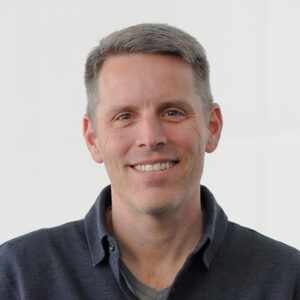
Nick Sargent
Next, Sargent shed insight on the outdoor industry’s reach. The winter sports economy is valued at $20.3 billion of the overall outdoor industry’s $827 billion. Colorado’s winter sports industry makes up $4.8 billion of that total, according to Colorado Ski Country.
“Colorado is the strongest winter sports market in the union. With all that sunshine and those wonderful mountains and that great snow, it’s a great place to participate,” Sargent said.
A resident of Park City, Utah, Sargent leads SIA—the winter industry’s nonprofit, member-owned trade association. SIA represents suppliers and service providers of consumer outdoor winter sports with constituents in the retail and resort communities and provides information and advocacy to support members’ business decisions.
“We’re all committed to working together,” Kaplan said of the nearly 500 ski areas that are part of the National Ski Areas Association, along with SIA’s 700 member organizations of manufacturers and retailers.
“You can’t ski if you don’t have skis to ski on,” Kaplan continued, connecting SIA and NSAA, “and you need cold temperatures and snow, and that’s what Mario is devoting his life to ensuring can continue to happen.”
Addressing Climate Change
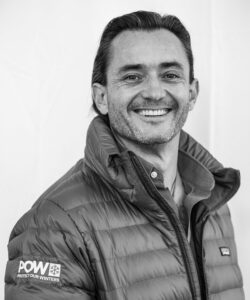
Mario Molina
Bringing Molina into the conversation, Olsen asked the Protect Our Winters executive director to provide context about the environmental challenges facing the snow sports industry.
“The projections over the next 20–30 years on a business-as-usual scenario gets us far above the 2 degrees that the IPCC has said is necessary to sustain life on Earth as we know it,” he warned. “We will probably end up at 3 to 3.5 degrees. At that point, whether we can ski or not is the least of our concerns. We’re looking at significant infrastructure collapse, water shortages, migration crises, food supply chain threats, etcetera.”
Molina said with swift and drastic action, we may be able to stabilize the planet’s temperature rise at 1.5 to 2 degrees.
“At that point, what we’re looking at is some reduced winter season, more variability in snowfall and less predictable winters,” he said. “If I were directly in the industry that would be my No. 1 concern—how do we manage our business model in a world where winters are no longer predictable? The difference between epic and absolute crap is a degree or two.”
Formed in 2007 by professional snowboarder Jeremy Jones, POW is a global nonprofit that helps passionate outdoor people protect the places and lifestyles they love from climate change. The community of athletes, scientists, creatives and business leaders advances nonpartisan policies that protect our world today and for future generations.
Embracing the Science
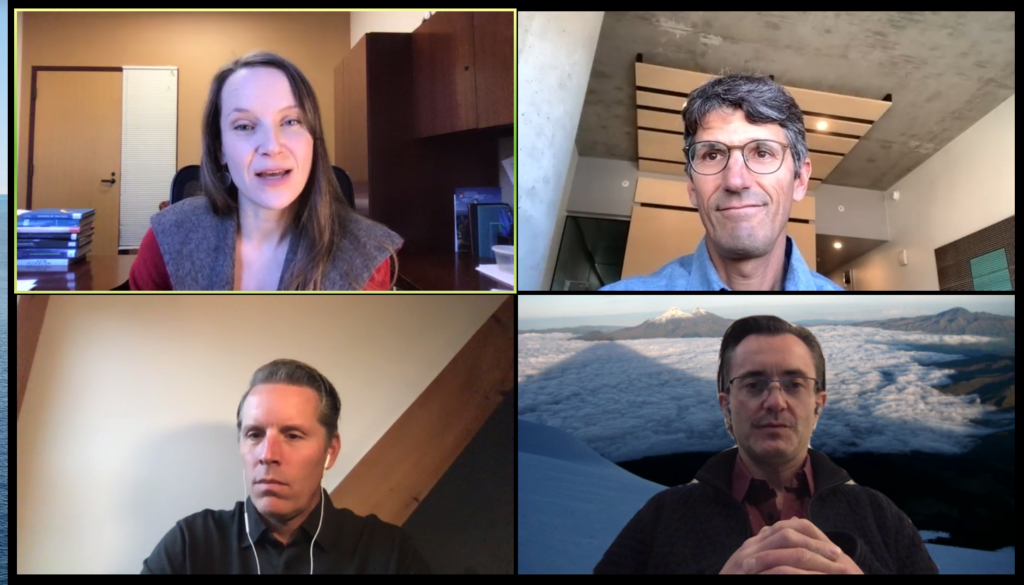
Voices of Experience: Sustainability in the Snow Sports Industry, Oct. 29, 2020
“The reality is that the science is not political. The science is pretty clear. Ninety-eight percent of scientists agree that climate change is real and that it’s human-caused and we do know where the solutions lie,” Molina said. “As an industry, the more we are able to embrace the science, and prepare and plan based on the scientific evidence, the better service we’ll be doing our businesses, our employees and all of us who love to participate in the outdoors.”
On the slopes, Kaplan said the science has translated to an average of 30 more frost-free days per season over the last two decades—i.e., winters that are shorter by a month.
“Snow is our basic currency that we operate on,” Sargent added. “With every record-breaking year of warmer temperatures, our industry becomes more and more vulnerable. That’s not a sustainable business model.”
Economic Impacts of Corporate Social Responsibility
Pivoting to financial sustainability, Olsen mentioned Black Rock CEO Larry Fink’s announcement that the company will stop investing its nearly $7 trillion of assets in companies that “pose a high sustainability-related risk.”
With big dollars at stake, Molina noted that adopting environmentally sustainable business practices and investment policies makes both sense AND cents.
“This is not only because all the sudden they have grown a real passion for conservation and environmentalism and want to protect the climate,” he said. “That is part of it, but they also realize that it’s beneficial to the bottom line. What we’re starting to see is that the actual solutions that we’re asking our elected officials to get behind, make market sense.”
Kaplan said Aspen Skiing Company started its environmental efforts in the mid-90s, with sustainability eventually becoming one of its core brand pillars. They recently partnered with POW on a national advertising campaign called “Give a Flake” to expand awareness of climate change to every visitor to Aspen’s ski resorts.
“We came to realize that this was a much bigger area as climate change became evident—that it was an existential issue. This wasn’t just something we were doing because it was nice; this was something we were doing because we have to save skiing and save the planet,” he said.
Advocating for Change
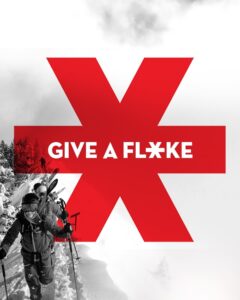
Photo courtesy instagram.com/aspensnowmass
The three executives emphasized the importance of individual and brand advocacy in effecting impactful change. Large outdoor brands such as Aspen, Burton and Patagonia have begun speaking out on climate change, shedding old fears about alienating consumers by getting political.
“Seventy-six percent of consumers agree that corporations and businesses actually have as much power or more than the federal government to take action or to influence action,” Molina said. “And they want to see businesses stand for the values that they share.”
At $880 billion, the overall contribution of the outdoor industry to the economy is more than twice that of the pharmaceutical industry, he said. Olsen paused to repeat the statistic. “Wow,” she said.
“It is a significant constituency that we’re trying to bring together,” Molina said. “And the more businesses that are willing to take a stance on this, the more influential we can be. We have not yet coalesced as strongly as we could to have the same lobbying power as pharmaceuticals do. But I think that’s changing.”
As the live audience listened with just days left in the election cycle, Kaplan, Sargent and Molina all encouraged audience members to learn about the science, educate themselves on climate policies, and to vote for candidates with the best climate plan.
“The stone age didn’t end because we ran out of stones. It ended because we invented better technologies,” Molina said. “And we’re at that same inflection point right now. Take every opportunity that you can to engage in the civic process. The democratic process … is not perfect, but it still works, and it only works with participation.”
Kaplan encouraged the many Daniels students watching the event—including members of the Outdoor Industry Club and Net Impact student group—to bring their values and passion to the workplace.
“Putting yourself out there in an authentic, passionate way is rewarding and you’ll be making a difference that goes way beyond your individual business contribution.”
Hosted by the Daniels College of Business and sponsored by U.S. Bank, Voices of Experience (VOE) brings CEOs and significant leaders into the University of Denver community to share the lessons learned from their triumphs, mistakes and decisions as they navigated through their leadership careers.
The next webinar in the Fall 2020 VOE Speaker Series, “Making Equity the Priority in Diversity, Equity and Inclusion (DEI),” will be held Nov. 11 at 11 a.m. MST.
For more information, or to view past VOE recordings, visit daniels.du.edu/voe.
